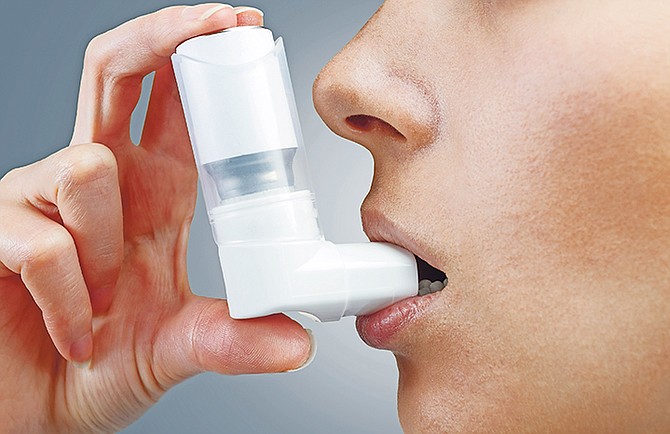By ALESHA CADET
Tribune Features Reporter
acadet@tribunemedia.net
EXPERIENCING symptoms such as wheezing, coughing, shortness of breath and chest tightness should never be taken lightly as it may be the beginning of a journey to asthma.
“Usually when someone is wheezing, that is how we most recognize asthma but if you have a cough that is recurrent or even chest tightness, any of those can be a presenting symptom. Also important, when we talk about asthma generally, we are really talking about bronchial asthma related to the lungs but there are other forms to recognize such as cardiac asthma,” said Dr Patrick D Roberts, Founding President of The Bahamas National Asthma Society.
With knowledge and understanding that expands as far as training at the American College of Chest Physicians, education at the Cardiff University of Wales, chairman at the World Symposium on Asthma in Infancy in Lisbon Portugal in 2004, and chairman of an International symposium held in Montreal in 2006, Dr Roberts said asthma is fairly prevalent in the Bahamas, increasing in prevalence among all ages from infancy to old age.
“There is no doubt that we have deaths in the Bahamas of all ages over the years as it relates to asthma. We are just in the process of compiling statistics and numbers but I can say that deaths are happening less frequently now,” said Dr Roberts.
He believes with organizations such as The Bahamas National Asthma Society present in the country a difference can be made; from knowledge and detection to treatment.
“One of the things we do of course is host monthly meetings at the Bahamas Medical Arts institute in Dean’s Lane. We also give a series of lectures at all of the hospitals, establishing a chest clinic at the Princes Margaret Hospital. When people go there with asthma they don’t have to stand in line, they can just go into the asthma room for service. People are now treated very quickly. We also have special literature that I have prepared for all the doctors and nurses on the Family Islands, and seminars being hosted quite frequently at both hospitals,” said Dr Robert.
Moreover during a Doctors Hospital Distinguished Monthly Lecture Series, Nicolette Chalke, a registered nurse at the Bahamas Medical Centre, discussed some of the main illnesses/afflictions people tend to have and when they need to seek medical attention at an urgent care centre like the BMC on Blake Road.
Some of the common illnesses that nurses and doctors see at the BMC’s urgent care centres include asthma attacks, common cold, shortness of breath and allergic reactions.
“Asthma attacks are very common. As an asthmatic you have home medications that you can take. But if you are not responding to the medication that is a really good time to come in or go to an urgent care centre, especially if it is progressively getting worse,” said Nurse Chalke.
“What we can do for you if you are having an asthma attack is give oxygen. We have the ability to give 100 percent oxygen to the blood. We can also monitor your respiration and oxygenation status. We have machines where we can monitor how much of the oxygen is getting into your blood.”





Comments
Use the comment form below to begin a discussion about this content.
Sign in to comment
Or login with:
OpenID